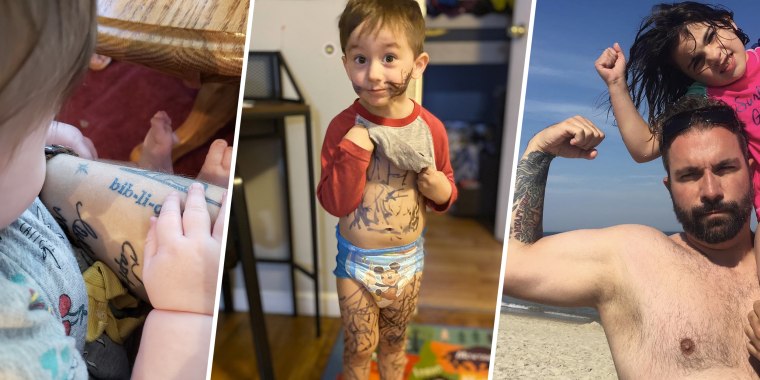As a mom with nearly 20 tattoos, I'm often sharing or discussing my body art with my two sons. My 3-year-old, forever an out-of-the-box thinker, has started giving himself "tattoos" with magic markers. My 7-year-old has graduated from that stage, thankfully, but consistently comments on my body ink and points out his favorites.
I also use my tattoos as a way to talk to my sons about important concepts in age-appropriate ways, and wondered if there were other parents out there like me.
Peter Genuardi, 44, a nonprofit marketing executive and entrepreneur living in Colorado, got his first tattoo 15 years ago.
"Now, I would say I have probably a dozen," Genuardi tells TODAY Parents. "My left forearm is covered, my right arm is just about entirely covered from the shoulder down, and I have one more on my leg."
Genuardi says that each one of his tattoos are not only motivational and symbolic, but serve as an "advertisement" of sorts.
"I want people to ask me about them — talk to me about them," he explains. "And that certainly includes my daughter."
Genuardi spent over 30 years struggling with body image issues, often subjecting himself to rigorous diets, starvation, and running hundreds of miles in penance. Only in the last three of four years — and with the help of family, friends, and a therapist — has he been able to get to a place of body positivity and self-love.
Now, he's using his tattoos to discuss those same topics with his daughter.
"My daughter is 12 and just started middle school, where she’s being exposed to lots of 'your body needs to be XYZ,'" he explains. "This year, I got a tattoo that says, 'It Takes All Kinds.' It’s a credo I’ve lived by my whole life, driving me to work on things that help others. Only recently have I thought about how I can love myself more by applying that idea to myself. The tattoo gave me the chance to talk to my daughter about how important it is to love yourself, and then love others."
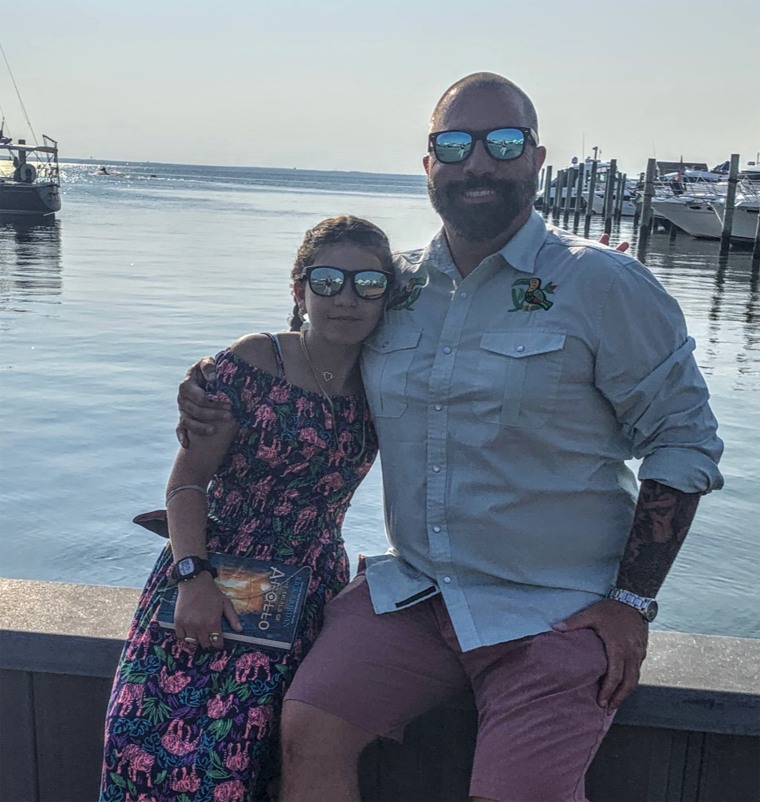
Kristi Beroldi, a licensed professional counselor with Thriveworks in Reston, says body art can help parents discuss importance concepts with their children in clear, age-appropriate ways.
"Utilizing tattoos as a jumping-off point to discuss different points in one’s own journey toward self-acceptance, and how that tattoo came about or helped them resolve certain feelings, can be a way to connect with your child," Beroldi tells TODAY. "It can show them that they aren’t alone, and encourage them to think outside the box in regards to the avenues they have to celebrate their body and manage their self-expression."
Beroldi, who is also a parent with tattoos and piercings, says her own daughter loves and actively engages with her tattoos, often pointing at them or kissing them.
"As she gets older, we will talk about the different ways that we can celebrate our bodies, through tattoos, piercings, clothing, make-up choices, and even engaging in physical activity."
Tattoo-inspired conversations can help introduce young children to 'big topics'
A Harvard School of Education survey of more than 3,000 students found that "adults don’t appear to be having meaningful and constructive conversations with young people" about topics like consent and bodily autonomy.
In the survey, 61% of participants ages 18 to 25 said they had never spoken with their parents about “being sure your partner wants to have sex and is comfortable doing so before having sex"; 49% never discussed assuring your “own comfort before engaging in sex"; and 58% of respondents had never had a conversation with their parents about the importance of “being a caring and respectful sexual partner.”
Casey Andrews, 40, a web designer living in Idaho, uses her five, very large and visible tattoos to teach her 5-year-old son about consent and bodily autonomy.
"My husband has no tattoos. So we have certainly had discussions with our son about how some people like tattoos, and some people don’t — and both is OK," she says. "And someday when he’s older, we will get into some details about why I got certain tattoos. For example, surviving domestic violence and control within close relationships, which will certainly be important lessons when he is stepping out into the dating world."
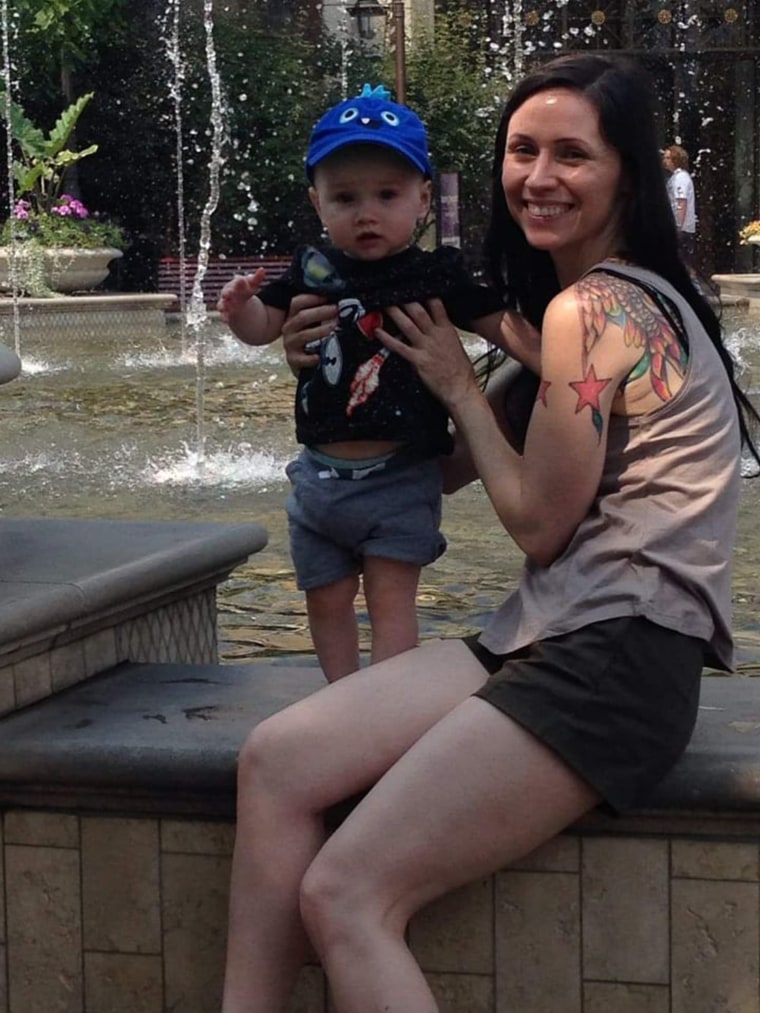
Beroldi says topics like consent and bodily autonomy can feel "big" for parents, especially if they're struggling to discuss them in age-appropriate ways. Researchers and educators suggest parents teach consent as a "life skill," separate and detached from sex, and continue to evolve those conversations as children grow older.
"I think as it pertains to children, I would focus on talking about how it is OK for people to make decisions regarding their body for any reason, i.e. it is OK to get a tattoo just because you like it, and you don’t owe anyone a meaningful explanation," she says. "Additionally, talking with them about how nothing implies consent — seeing someone’s tattoo can be exciting and you may want to ask questions, but it is good practice to ask the person if they are open to discussing their tattoo with you. The fact that something is visible does not mean it is open for discussion."
Parents aren't letting tattoo stigma slow them down
Kate Mervine, 39, a mother of four and "nana" to one grandchild, with another on the way, can't tell you how many tattoos she has.
"My artist and I counted a few years back and we were at 84, but to be honest I have finally stopped counting," Mervine tells TODAY. "Both of my arms are almost fully-sleeved, my upper back is full, both of my feet as well as both heels, my left calf and both ankles, behind my ears, on my neck, thumbs, both hands... yeah, pretty much all over."
One 2019 Ipsos poll found that 30% of Americans have at least one tattoo — up from 21% in 2012. Yet a 2021 study, conducted online and with 298 participants, found that "tattooed individuals are at an increased risk for experiencing stigma and negative attitudes."
"I think the side-eye game of a lot of the other moms when my kids were smaller was really strong, but to be honest I never spared much thought for what anyone else thought," Mervine adds.
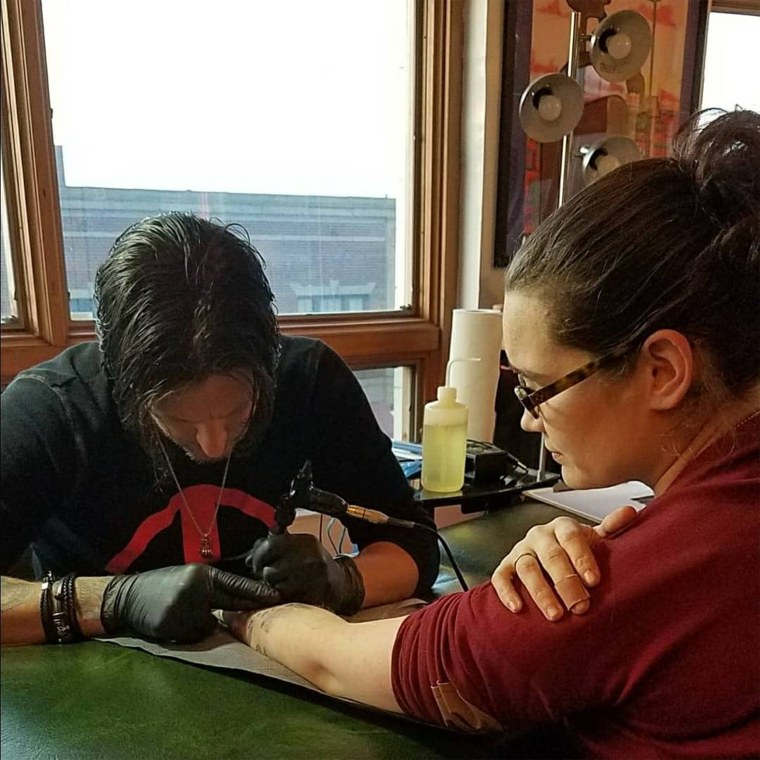
Instead, Mervine focuses on the personal nature of her tattoos — many of them are inspired by and pay homage to her family, including a Celtic Tree with her children’s birthdates and memorial tattoos for family members who have passed — and the ongoing discussions her tattoos have inspired.
“Conversations always get started based on their age and curiosity, which I just love,” she explains. “I have a ton of tattoos, while my husband only has four. The boys used to tease him because I could ‘handle the pain better than their dad’ — but it did really open up great chats about gender stereotypes. All of my kiddos feel comfortable coming to me with anything, with really no fear of judgment. For me, that is priceless.”
It's normal for young children to want tattoos, too
"It is developmentally appropriate for children to want to emulate their parents, and this is true with tattooed parents as well," Beroldi explains. "It isn’t 'good' or 'bad' that a child does this, it is just how they are learning to navigate the world and their own self-image."
Jémm Merritt, a 29-year-old research medical coordinator living in North Carolina, says her 10-year-old son has always been interested in her tattoos.
"When he was about 5 or 6, he would color them in with markers as I slept," Merritt, who has over 100 tattoos, tells TODAY. "Over the years, he’s even helped me pick out some that he’s wanted me to tattoo. In 2015 he was afraid of aliens, so one day he said, 'Mommy can you get a tattoo of an alien, so I know it’s not scary?' So, I did just that. We call him Roger the ankle alien."
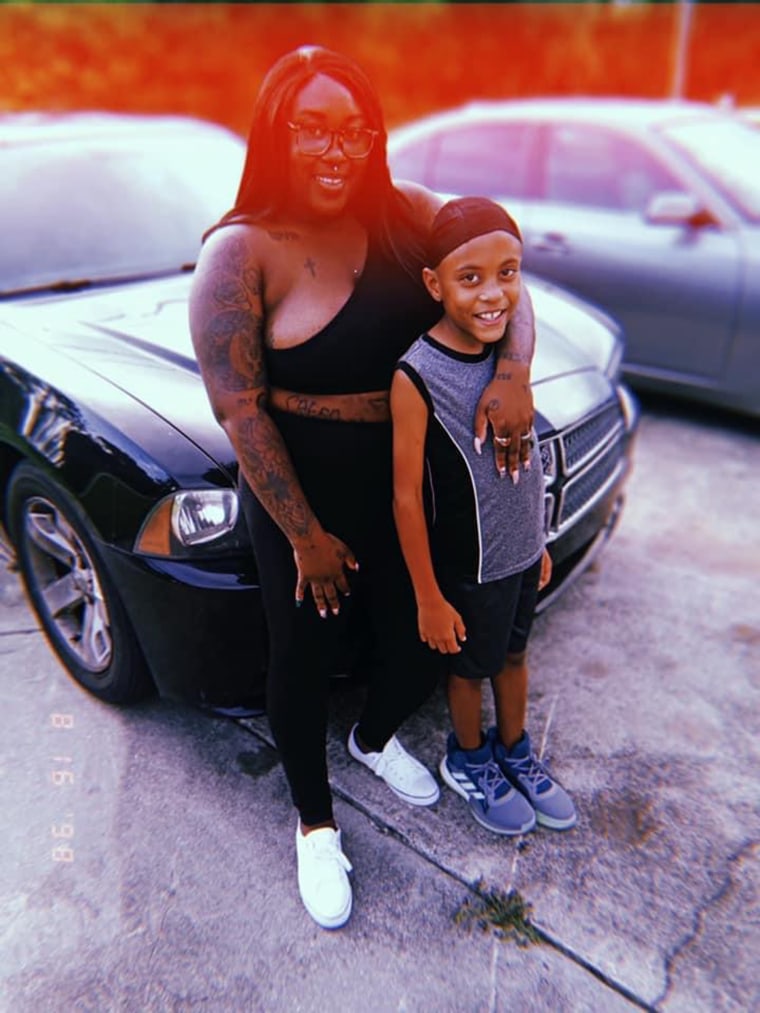
Andrews says her son has also always loved her body art, too, and has plans for her next tattoo.
"When he was around 2 years old and starting to learn to use markers, he would draw all over his arms and say he had 'tattoos like mommy,'" she explains, adding that while her son used to want tattoos, now he understands how permanent they are and, even at his young age, is far more hesitant.
"He did draw me a picture that included a heart and his name, and wants me to get it as a tattoo," she adds. "I intend to do it, however he thinks it would look best on my forehead because, I quote, 'When people see you for the first time they will know you love (me).' The tattoo will not be on my forehead."
As for Genuardi, he says his daughter hasn't given herself "tattoos" with magic markers since she was 5 or 6. But he can still recall those moments, the frustration that immediately followed, as well as the realization that even those messy instances served a purpose.
"It took a lot for me to not freak out and lose my mind when she drew things on her forehead," he explains. "But it did create that opportunity for us to have a conversation about taking care of your body and respecting your body. It also pushed me to think about how not to demand that she only do one thing or another with her body, but that it's really a responsibility that she'll need to carry for her whole life."
Tattoos can remind children that self-care is important for parents, too
At a time when parents' and kids' mental health is suffering as a result of the ongoing pandemic and a lack of systemic support — like mandatory paid family leave, affordable child care and access to mental health services — tattoos can serve as a reminder to children that self-care is important for everyone.
"My son has a hard time with self-care — he can forget to comb his hair or put lotion on his knees before heading out during winter," Merritt says. "But whenever I get a new tattoo, he is always there to remind me to 'take care of it.' In doing so, we’ve started to go back and forth: I take care of my tattoos because I love them, and he takes care of him because he loves his curly hair."
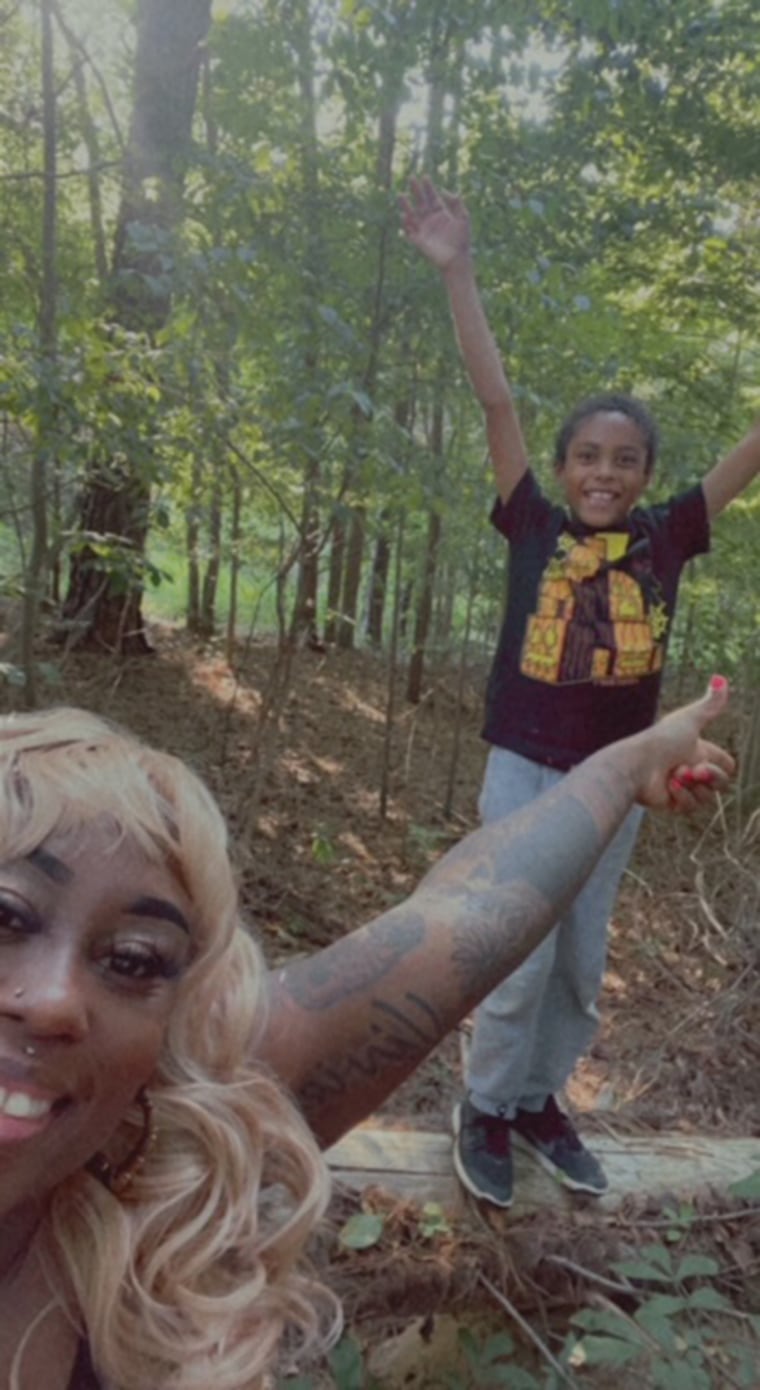
Beroldi says that while talking about the importance of self-care with your child is important, following through by modeling the ways you care for and honor yourself is even more vital.
"You don’t stop being you when you become a parent," she adds. "Being a parent is part of who you are, not all of who you are, and continuing to do things to express yourself and take care of yourself is imperative to your functioning as a parent and as a person."
Genuardi, who often brings his daughter along when he is getting tattooed to demystify the process, says that the honest conversations that he has with his daughter will continue, especially as she gets older and navigates the world.
"By virtue of my tattoos being personal to me, and also having some touches that are personal to her, it creates the opportunity to have those conversations and to be more full with my daughter about what I've been struggling with or challenged by," he explains. "And I think that really creates the foundation for us to have those kinds of conversations on an ongoing basis."
